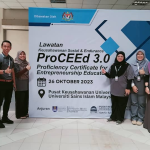While offering advice, they get caught up in gossip, judgmental behavior, and words that bring others down. The big question is — are their words truly meant to help, or are they just trying to look better than others?
We must remember that every word and action carries responsibility. In society and organizations, we are judged not just by our results or appearance, but by how we lead ourselves and influence those around us. As the saying goes, “karma never sleeps” — every action, good or bad, has consequences. That’s why reflecting on ourselves before correcting others is so important.
The words of Sayidina Umar al-Khattab are timeless: “Do not forget yourself while advising others". This reminder is not just about sincerity — it's a fundamental principle of real leadership: a leader must lead themselves before they can lead others.
Two important leadership and organizational psychology concepts help us understand this better: Authentic Leadership and Self-Awareness. These two elements are crucial not only for personal growth but also for fostering a healthy and respectful workplace culture.
Authentic Leadership: Leading with Honesty and Integrity
Authentic leadership is a leadership style that is based on being real, honest, and guided by strong values. Authentic leaders don’t just talk about doing the right thing — they live by it. They’re not afraid to show their weaknesses, because they see those moments as opportunities to grow.
According to the theory, authentic leaders have four main qualities:
- Self-Awareness – Knowing your own strengths and weaknesses,
- Balanced Processing – Being fair and open to other perspectives,
- Relational Transparency – Communicating openly and sincerely,
- Internalized Moral Perspective – Making decisions based on ethics, not pressure from others.
Leaders with these traits don’t feel proud when correcting others — they stay humble, knowing they are imperfect. This kind of leadership builds trust, respects others as human beings, and creates a safe environment for everyone to thrive.
Unfortunately, we often see people in leadership positions focusing more on appearances than actions. They are quick to tell others to change, but are unwilling to change themselves. They like to judge, but dislike being judged by others. This kind of leadership is not only inauthentic — it’s damaging.
This issue can also happen in universities. Some academic figures are well-known for writing and speaking about ethics, student excellence, and professionalism. Yet, behind closed doors, they fail to demonstrate the leadership they preach. Some lecturers expect students to act professionally, yet they themselves lack courtesy in their communication. A toxic culture of “micro-politics” also stifles innovation and punishes those with critical opinions.
One student once shared how humiliated they felt after being scolded in front of the class for asking a “simple” question. In a healthy learning environment, every question is valid — it’s a sign of curiosity, not incompetence. What may seem minor to a lecturer could deeply affect a student’s confidence. This is where educational leadership must come with humanity — to listen, understand, and to guide, not just to teach.
In today’s challenging IPTA climate — with financial pressure, strict performance evaluations, and the need to uphold academic freedom — authentic leadership is more critical than ever. We need leaders driven by purpose, moral courage, and a willingness to grow, not those who only care about public image.
Self-Awareness: Holding Up a Mirror
Self-awareness means knowing how you feel, how you react to situations, and how your behavior affects others. It’s the foundation of emotional intelligence and a key part of good leadership.
Someone with strong self-awareness doesn’t judge others easily. They recognize that everyone has their own struggles and stories. They don’t label — they try to understand.
On the flip side, people who lack self-awareness can fall into the trap of moral superiority. They feel entitled to behave poorly, just because they once did something good. This is known as moral licensing — like saying, “I gave a motivational talk, so it's okay if I gossip a little”. But the truth is, none of us is above ethical responsibility.
In organizations, low self-awareness can create a toxic work environment. Leaders may turn into silent dictators, ruling with ego instead of empathy. Staff become afraid to speak up, and a blame culture takes over - productivity and morale decline.
In IPTAs, we need more leaders — deans, program heads, and senior lecturers — who understand how their words impact students, how their decisions shape the faculty culture, and how their actions influence the motivation of academic and support staff.
It’s important to realize that everyone around us — students, colleagues, administrators — carries their own burdens. A harsh word can hurt. A kind gesture can save someone’s day. So let us lead with empathy, listen with heart, and speak with sincerity.
Focus on Improvement, Not Judgment
Talking or writing about values doesn’t mean we’re perfect. But it shows we are trying. Good writing or advice isn’t meant to judge, but to invite others to reflect. Constructive criticism is intended to build, not to break. As a wise saying goes, “If you can’t be a candle to light the way, don’t be the wind that blows it out”.
We can learn from the lives of great leaders in history. They didn’t just preach. They lived among the people, listened to them, and constantly improved themselves. Their leadership was not about words — it was about action and compassion.
In today’s world, whether we’re corporate leaders, politicians, teachers, or heads of departments, leadership should start with a mirror. Ask ourselves — how do my words affect others? Am I helping or hurting? Are my intentions sincere?
Final Thought: Leadership Begins Within
In a world full of voices and opinions, we need more leaders who don’t just talk, but who truly are the message. Leaders who not only point the way, but walk the path. Leaders who don’t just give motivation, but live it through discipline, values, and awareness.
We’re all human. None of us will be perfect. However, making the effort to improve our words, actions, and intentions — is the first step to real leadership.
So let’s take time to reflect. Before we advise others, let’s check in with ourselves. Before we correct, let’s be willing to learn. Because in this fast-paced, high-pressure world, only truly self-aware and authentic leaders can guide others, — not with noise, but with heart.
“Leadership is not about power, but about responsibility. And the first responsibility is to yourself”.










